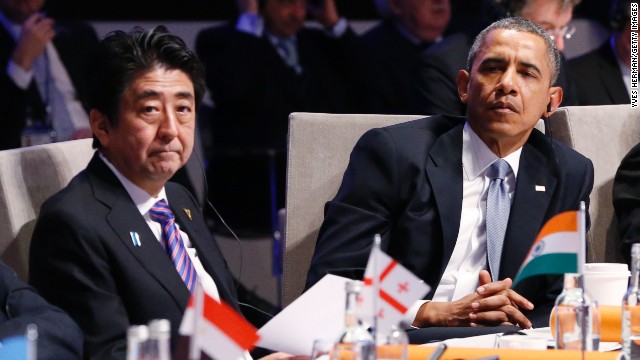Japan agrees to hand over nuclear material to United States
March 25, 2014 -- Updated 0824 GMT (1624 HKT)
Japanese PM Shinzo Abe and U.S. President Barack Obama pictured in The Hague, Netherlands on March 24.
(CNN) -- Japan and the United States have co-signed an agreement to remove and dispose of hundreds of kilograms of highly enriched uranium (HEU) and separated plutonium from the Asian nation.
The fissile material will be transported from the Fast Critical Assembly (FCA) at the Japan Atomic Energy Agency (JAEA) in Japan to a "secure facility" in the United States, according to astatement released by the White House, and "fully converted into less sensitive forms."
"This pledge complements the significant role that both Japan and the United States are playing in finding new ways to continue improving global nuclear security ... Japan has demonstrated its leadership by resolving to remove all special nuclear material from the FCA.
"Our two countries encourage others to consider what they can do to further HEU and plutonium minimization."
Obama's long-term goal
The U.S. has a longstanding goal of reducing -- and safeguarding -- the world's stockpile of fissile material, in an effort to reduce access by terrorist groups, criminals and "unauthorized actors."
The deal comes at a time when the U.S. hopes to persuade Iran to halt their enrichment program, and tensions on the Korean Peninsula are hightened by North Korea's nuclear weapons program.
Japanese Prime Minister Shinzo Abe and U.S. President Barack Obama announced the deal this week at the 2014Nuclear Security Summit in The Hague.
It allows for over 700 lb (315 kg) of weapons-grade nuclear material to be transported and "downblended" into safer material in the United States. The fuel, which was purchased from the U.S. in the 1960s, has been used by the JAEA for research purposes.
The agreed-upon amount which will head to the United States is a fraction of Japan's overall plutonium holdings.
Japan shows "leadership"
"This is the biggest commitment to remove fissile materials in the history of the summit process that President Obama launched," Elizabeth Sherwood-Randall of the National Security Council told theNew York Times. "It is a demonstration of Japan's shared leadership on nonproliferation."
Previously in favor of refinement of fuel for use it its own domestic nuclear power grid, the agreement comes at a time when many Japanese nuclear power facilities have been mothballed, following the 2011 reactor meltdown in Fukushima. The accident, which occurred when a powerful tsunami damaged the facility, was the worst nuclear disaster since Chernobyl in 1986.
Beijing has previously criticized Tokyo's stockpiling of nuclear material -- suggesting that it had the capability to produce nuclear weapons relatively quickly. However, as history's only victim of atomic warfare, Japan's post-war constitution forbids the pursuance of nuclear weapons, with public opinion also overwhelmingly against the policy.
Japanese senior nationals security adviser Yosuke Isozaki told theJapan Times that "Japan shares a vision of a world without nuclear weapons."
The U.S. hopes to convince more nations to use reprocessing and enrichment facilities in existing nuclear states in an effort to minimize proliferation risks.








0 comments:
Post a Comment